University Healthcare Ethics Case Study: Analysis and Recommendations
VerifiedAdded on 2021/06/15
|8
|1729
|108
Case Study
AI Summary
This case study examines a healthcare ethics case involving a cholera outbreak in Malawi, focusing on the ethical issues arising from a hospital's decision to deny treatment to students not residing in the school's boarding facilities. The analysis highlights violations of human rights, professional codes of conduct, and healthcare ethics principles, specifically the denial of medical care based on residency. The study delves into the ethical duties of healthcare professionals, including justice, nonmaleficence, beneficence, and autonomy. The paper recommends improvements in hospital emergency preparedness, adherence to ethical codes, and protection of patient rights. It underscores the importance of treating all patients with respect and dignity, regardless of their circumstances, and the potential legal consequences of ethical violations. The case concludes with a call for hospitals to ensure adequate medical supplies and emergency provisions to handle similar situations effectively.
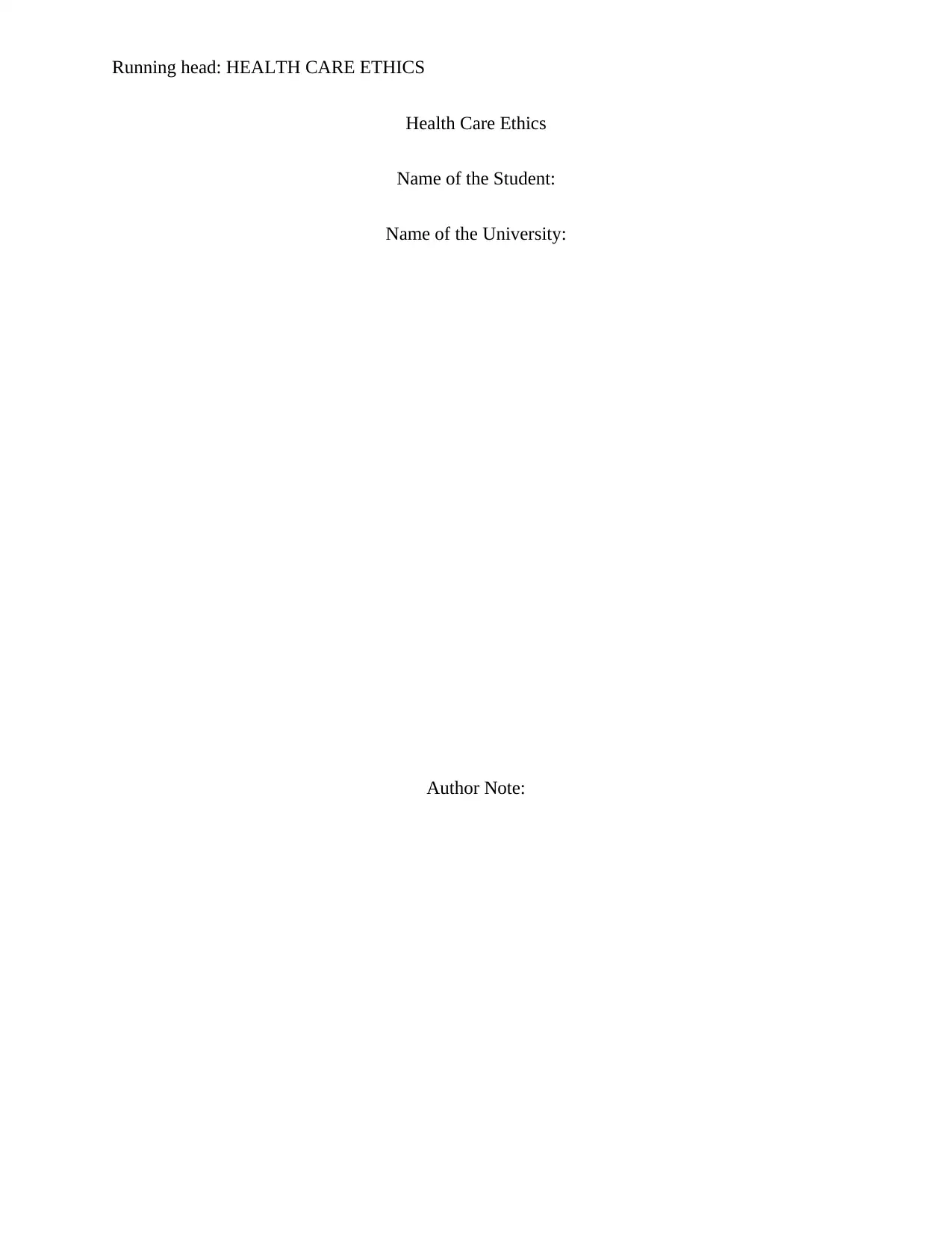
Running head: HEALTH CARE ETHICS
Health Care Ethics
Name of the Student:
Name of the University:
Author Note:
Health Care Ethics
Name of the Student:
Name of the University:
Author Note:
Paraphrase This Document
Need a fresh take? Get an instant paraphrase of this document with our AI Paraphraser
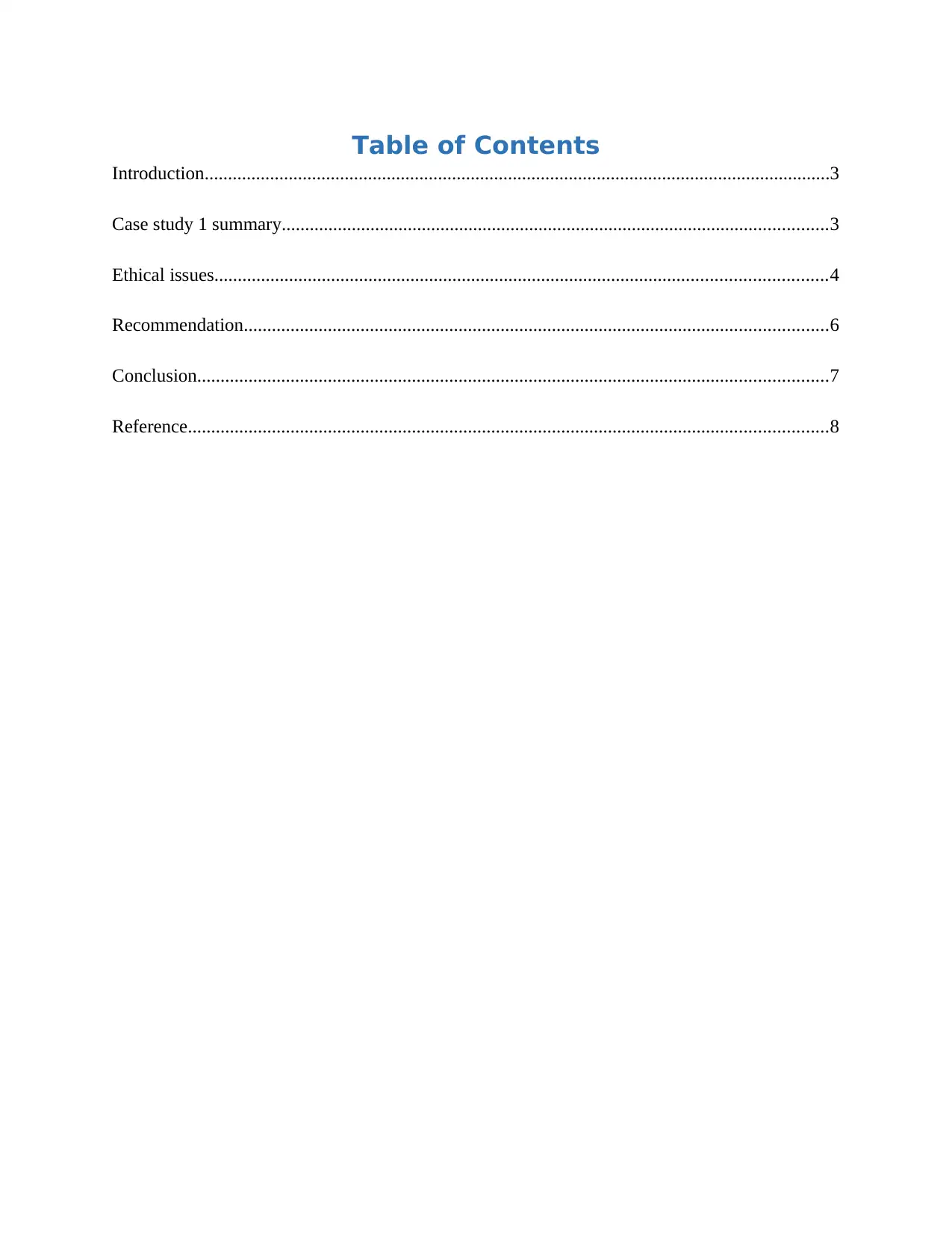
Table of Contents
Introduction......................................................................................................................................3
Case study 1 summary.....................................................................................................................3
Ethical issues...................................................................................................................................4
Recommendation.............................................................................................................................6
Conclusion.......................................................................................................................................7
Reference.........................................................................................................................................8
Introduction......................................................................................................................................3
Case study 1 summary.....................................................................................................................3
Ethical issues...................................................................................................................................4
Recommendation.............................................................................................................................6
Conclusion.......................................................................................................................................7
Reference.........................................................................................................................................8
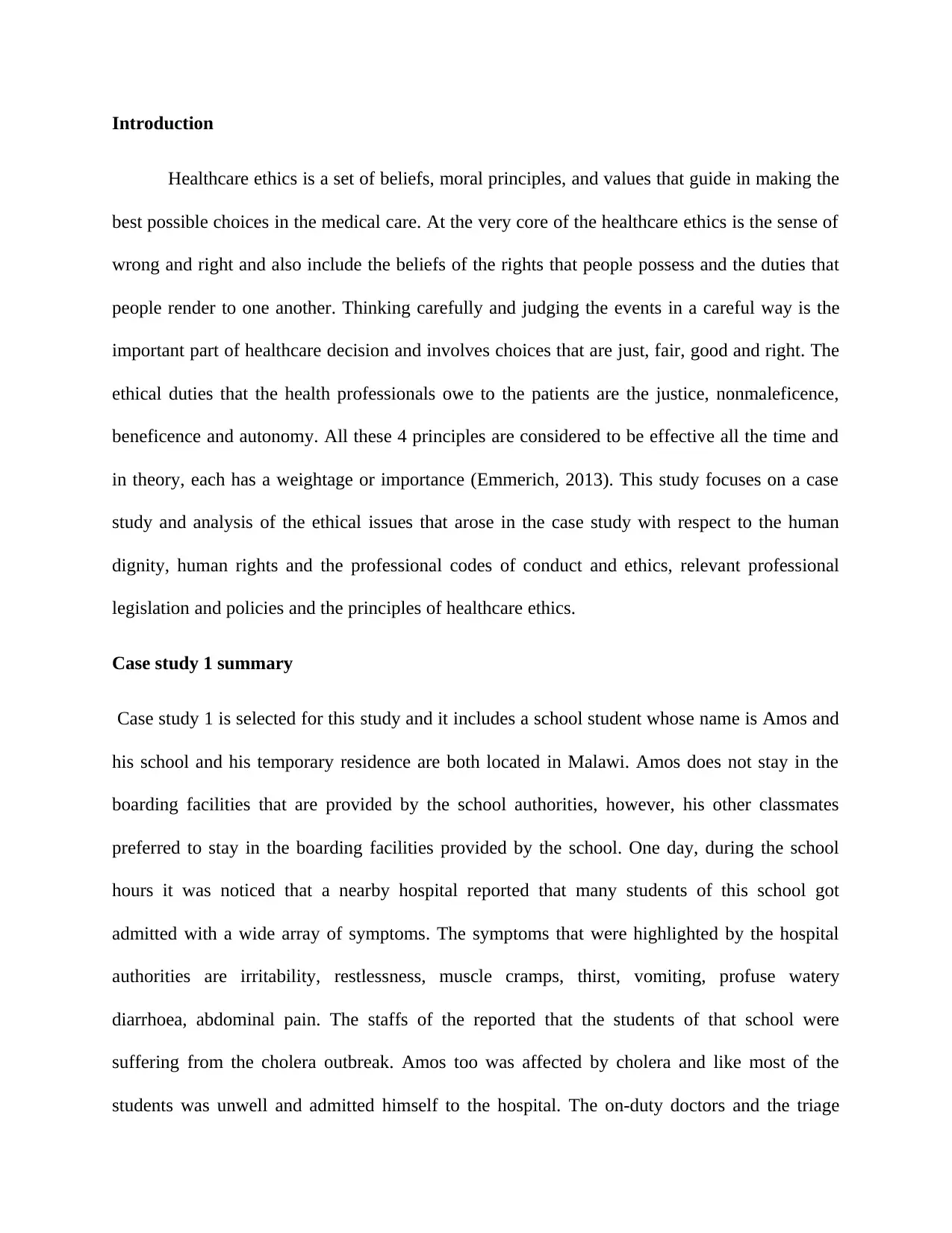
Introduction
Healthcare ethics is a set of beliefs, moral principles, and values that guide in making the
best possible choices in the medical care. At the very core of the healthcare ethics is the sense of
wrong and right and also include the beliefs of the rights that people possess and the duties that
people render to one another. Thinking carefully and judging the events in a careful way is the
important part of healthcare decision and involves choices that are just, fair, good and right. The
ethical duties that the health professionals owe to the patients are the justice, nonmaleficence,
beneficence and autonomy. All these 4 principles are considered to be effective all the time and
in theory, each has a weightage or importance (Emmerich, 2013). This study focuses on a case
study and analysis of the ethical issues that arose in the case study with respect to the human
dignity, human rights and the professional codes of conduct and ethics, relevant professional
legislation and policies and the principles of healthcare ethics.
Case study 1 summary
Case study 1 is selected for this study and it includes a school student whose name is Amos and
his school and his temporary residence are both located in Malawi. Amos does not stay in the
boarding facilities that are provided by the school authorities, however, his other classmates
preferred to stay in the boarding facilities provided by the school. One day, during the school
hours it was noticed that a nearby hospital reported that many students of this school got
admitted with a wide array of symptoms. The symptoms that were highlighted by the hospital
authorities are irritability, restlessness, muscle cramps, thirst, vomiting, profuse watery
diarrhoea, abdominal pain. The staffs of the reported that the students of that school were
suffering from the cholera outbreak. Amos too was affected by cholera and like most of the
students was unwell and admitted himself to the hospital. The on-duty doctors and the triage
Healthcare ethics is a set of beliefs, moral principles, and values that guide in making the
best possible choices in the medical care. At the very core of the healthcare ethics is the sense of
wrong and right and also include the beliefs of the rights that people possess and the duties that
people render to one another. Thinking carefully and judging the events in a careful way is the
important part of healthcare decision and involves choices that are just, fair, good and right. The
ethical duties that the health professionals owe to the patients are the justice, nonmaleficence,
beneficence and autonomy. All these 4 principles are considered to be effective all the time and
in theory, each has a weightage or importance (Emmerich, 2013). This study focuses on a case
study and analysis of the ethical issues that arose in the case study with respect to the human
dignity, human rights and the professional codes of conduct and ethics, relevant professional
legislation and policies and the principles of healthcare ethics.
Case study 1 summary
Case study 1 is selected for this study and it includes a school student whose name is Amos and
his school and his temporary residence are both located in Malawi. Amos does not stay in the
boarding facilities that are provided by the school authorities, however, his other classmates
preferred to stay in the boarding facilities provided by the school. One day, during the school
hours it was noticed that a nearby hospital reported that many students of this school got
admitted with a wide array of symptoms. The symptoms that were highlighted by the hospital
authorities are irritability, restlessness, muscle cramps, thirst, vomiting, profuse watery
diarrhoea, abdominal pain. The staffs of the reported that the students of that school were
suffering from the cholera outbreak. Amos too was affected by cholera and like most of the
students was unwell and admitted himself to the hospital. The on-duty doctors and the triage
⊘ This is a preview!⊘
Do you want full access?
Subscribe today to unlock all pages.

Trusted by 1+ million students worldwide
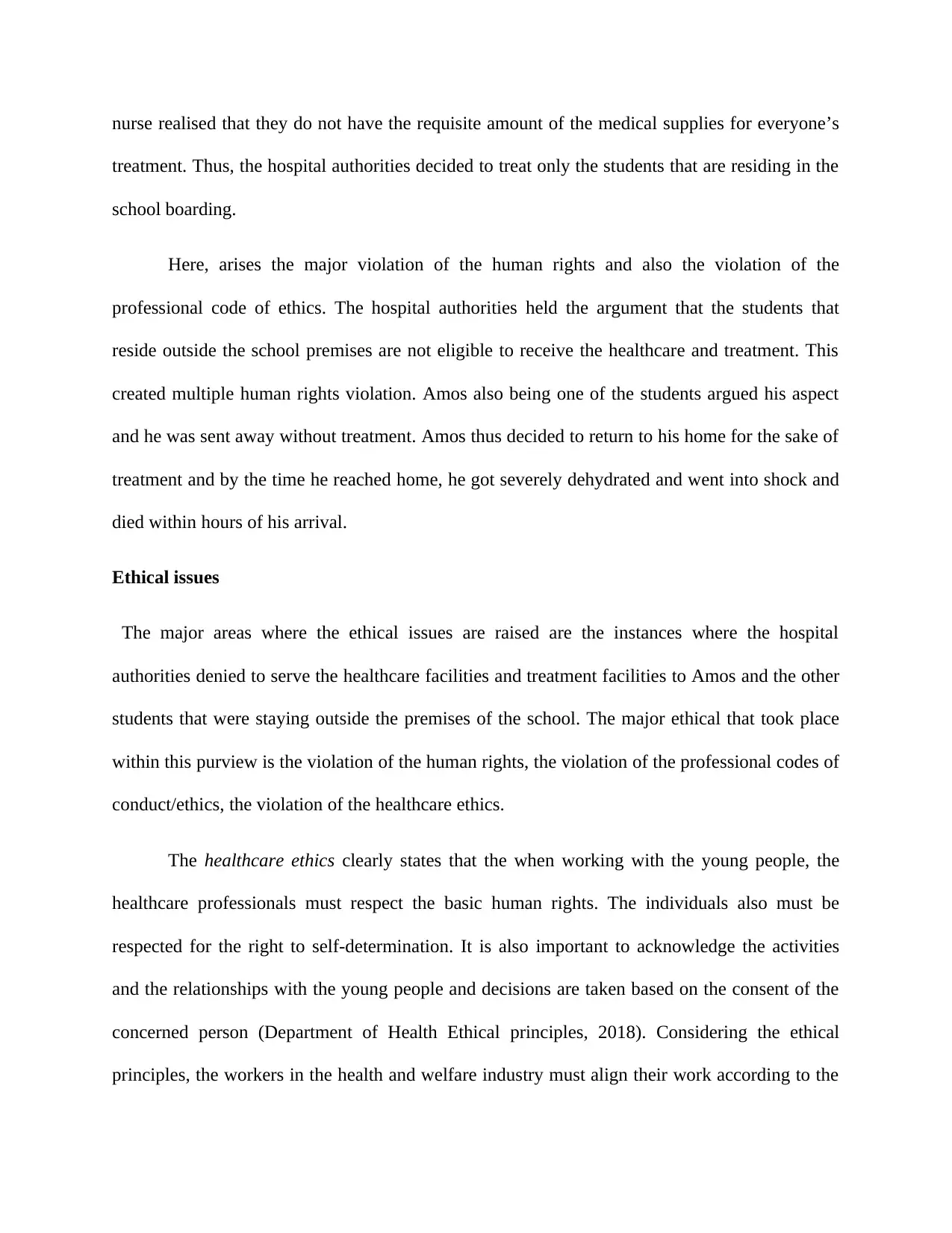
nurse realised that they do not have the requisite amount of the medical supplies for everyone’s
treatment. Thus, the hospital authorities decided to treat only the students that are residing in the
school boarding.
Here, arises the major violation of the human rights and also the violation of the
professional code of ethics. The hospital authorities held the argument that the students that
reside outside the school premises are not eligible to receive the healthcare and treatment. This
created multiple human rights violation. Amos also being one of the students argued his aspect
and he was sent away without treatment. Amos thus decided to return to his home for the sake of
treatment and by the time he reached home, he got severely dehydrated and went into shock and
died within hours of his arrival.
Ethical issues
The major areas where the ethical issues are raised are the instances where the hospital
authorities denied to serve the healthcare facilities and treatment facilities to Amos and the other
students that were staying outside the premises of the school. The major ethical that took place
within this purview is the violation of the human rights, the violation of the professional codes of
conduct/ethics, the violation of the healthcare ethics.
The healthcare ethics clearly states that the when working with the young people, the
healthcare professionals must respect the basic human rights. The individuals also must be
respected for the right to self-determination. It is also important to acknowledge the activities
and the relationships with the young people and decisions are taken based on the consent of the
concerned person (Department of Health Ethical principles, 2018). Considering the ethical
principles, the workers in the health and welfare industry must align their work according to the
treatment. Thus, the hospital authorities decided to treat only the students that are residing in the
school boarding.
Here, arises the major violation of the human rights and also the violation of the
professional code of ethics. The hospital authorities held the argument that the students that
reside outside the school premises are not eligible to receive the healthcare and treatment. This
created multiple human rights violation. Amos also being one of the students argued his aspect
and he was sent away without treatment. Amos thus decided to return to his home for the sake of
treatment and by the time he reached home, he got severely dehydrated and went into shock and
died within hours of his arrival.
Ethical issues
The major areas where the ethical issues are raised are the instances where the hospital
authorities denied to serve the healthcare facilities and treatment facilities to Amos and the other
students that were staying outside the premises of the school. The major ethical that took place
within this purview is the violation of the human rights, the violation of the professional codes of
conduct/ethics, the violation of the healthcare ethics.
The healthcare ethics clearly states that the when working with the young people, the
healthcare professionals must respect the basic human rights. The individuals also must be
respected for the right to self-determination. It is also important to acknowledge the activities
and the relationships with the young people and decisions are taken based on the consent of the
concerned person (Department of Health Ethical principles, 2018). Considering the ethical
principles, the workers in the health and welfare industry must align their work according to the
Paraphrase This Document
Need a fresh take? Get an instant paraphrase of this document with our AI Paraphraser
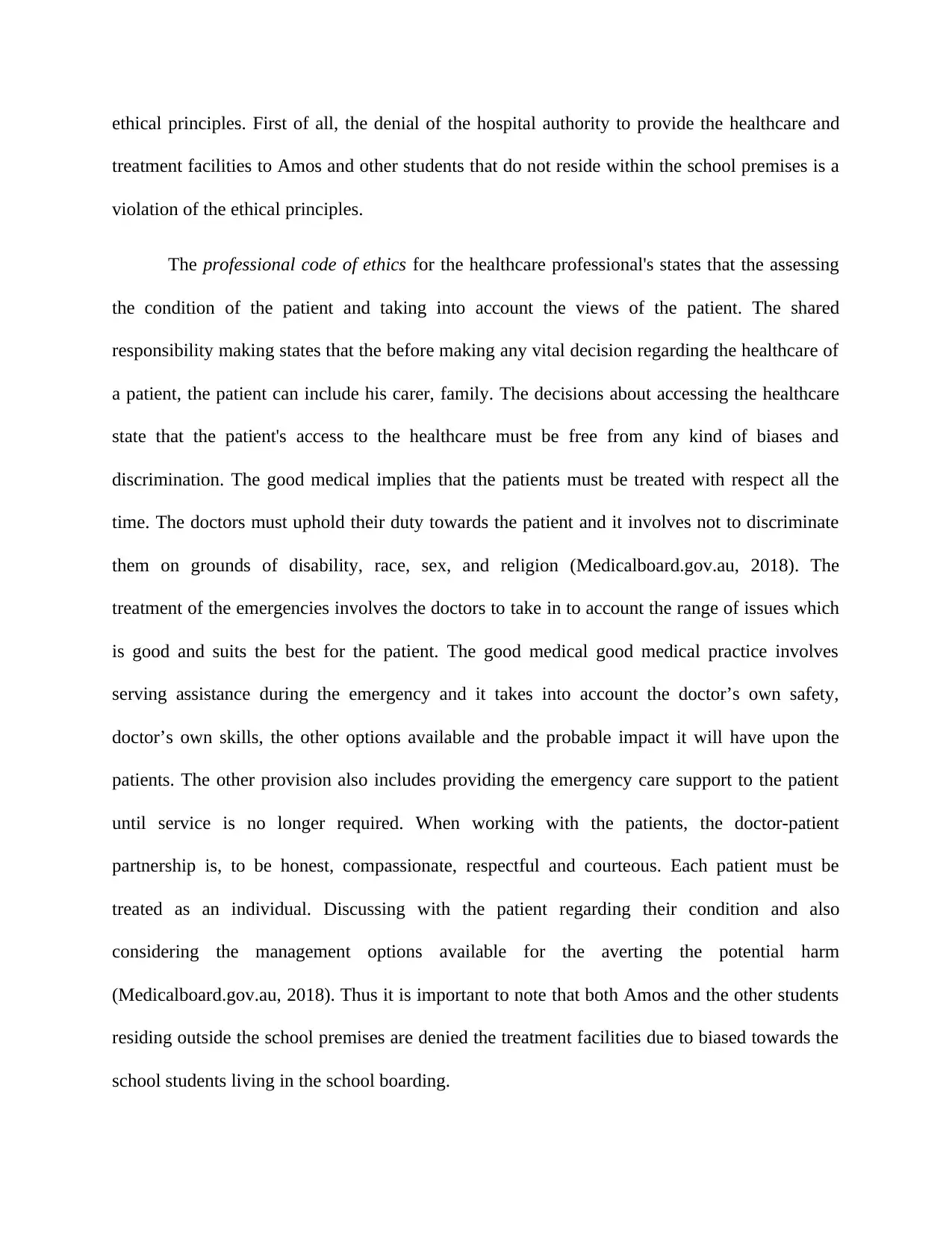
ethical principles. First of all, the denial of the hospital authority to provide the healthcare and
treatment facilities to Amos and other students that do not reside within the school premises is a
violation of the ethical principles.
The professional code of ethics for the healthcare professional's states that the assessing
the condition of the patient and taking into account the views of the patient. The shared
responsibility making states that the before making any vital decision regarding the healthcare of
a patient, the patient can include his carer, family. The decisions about accessing the healthcare
state that the patient's access to the healthcare must be free from any kind of biases and
discrimination. The good medical implies that the patients must be treated with respect all the
time. The doctors must uphold their duty towards the patient and it involves not to discriminate
them on grounds of disability, race, sex, and religion (Medicalboard.gov.au, 2018). The
treatment of the emergencies involves the doctors to take in to account the range of issues which
is good and suits the best for the patient. The good medical good medical practice involves
serving assistance during the emergency and it takes into account the doctor’s own safety,
doctor’s own skills, the other options available and the probable impact it will have upon the
patients. The other provision also includes providing the emergency care support to the patient
until service is no longer required. When working with the patients, the doctor-patient
partnership is, to be honest, compassionate, respectful and courteous. Each patient must be
treated as an individual. Discussing with the patient regarding their condition and also
considering the management options available for the averting the potential harm
(Medicalboard.gov.au, 2018). Thus it is important to note that both Amos and the other students
residing outside the school premises are denied the treatment facilities due to biased towards the
school students living in the school boarding.
treatment facilities to Amos and other students that do not reside within the school premises is a
violation of the ethical principles.
The professional code of ethics for the healthcare professional's states that the assessing
the condition of the patient and taking into account the views of the patient. The shared
responsibility making states that the before making any vital decision regarding the healthcare of
a patient, the patient can include his carer, family. The decisions about accessing the healthcare
state that the patient's access to the healthcare must be free from any kind of biases and
discrimination. The good medical implies that the patients must be treated with respect all the
time. The doctors must uphold their duty towards the patient and it involves not to discriminate
them on grounds of disability, race, sex, and religion (Medicalboard.gov.au, 2018). The
treatment of the emergencies involves the doctors to take in to account the range of issues which
is good and suits the best for the patient. The good medical good medical practice involves
serving assistance during the emergency and it takes into account the doctor’s own safety,
doctor’s own skills, the other options available and the probable impact it will have upon the
patients. The other provision also includes providing the emergency care support to the patient
until service is no longer required. When working with the patients, the doctor-patient
partnership is, to be honest, compassionate, respectful and courteous. Each patient must be
treated as an individual. Discussing with the patient regarding their condition and also
considering the management options available for the averting the potential harm
(Medicalboard.gov.au, 2018). Thus it is important to note that both Amos and the other students
residing outside the school premises are denied the treatment facilities due to biased towards the
school students living in the school boarding.
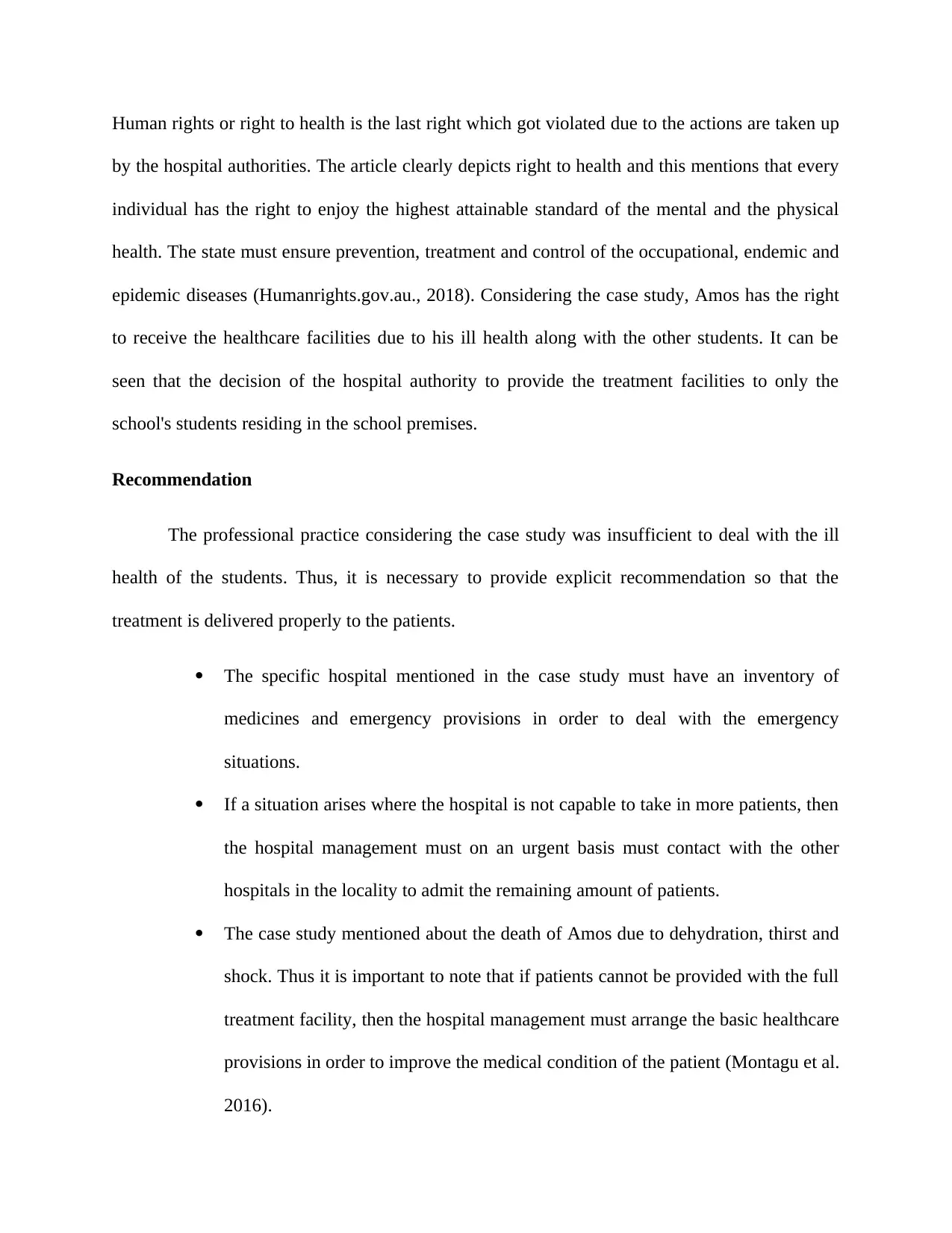
Human rights or right to health is the last right which got violated due to the actions are taken up
by the hospital authorities. The article clearly depicts right to health and this mentions that every
individual has the right to enjoy the highest attainable standard of the mental and the physical
health. The state must ensure prevention, treatment and control of the occupational, endemic and
epidemic diseases (Humanrights.gov.au., 2018). Considering the case study, Amos has the right
to receive the healthcare facilities due to his ill health along with the other students. It can be
seen that the decision of the hospital authority to provide the treatment facilities to only the
school's students residing in the school premises.
Recommendation
The professional practice considering the case study was insufficient to deal with the ill
health of the students. Thus, it is necessary to provide explicit recommendation so that the
treatment is delivered properly to the patients.
The specific hospital mentioned in the case study must have an inventory of
medicines and emergency provisions in order to deal with the emergency
situations.
If a situation arises where the hospital is not capable to take in more patients, then
the hospital management must on an urgent basis must contact with the other
hospitals in the locality to admit the remaining amount of patients.
The case study mentioned about the death of Amos due to dehydration, thirst and
shock. Thus it is important to note that if patients cannot be provided with the full
treatment facility, then the hospital management must arrange the basic healthcare
provisions in order to improve the medical condition of the patient (Montagu et al.
2016).
by the hospital authorities. The article clearly depicts right to health and this mentions that every
individual has the right to enjoy the highest attainable standard of the mental and the physical
health. The state must ensure prevention, treatment and control of the occupational, endemic and
epidemic diseases (Humanrights.gov.au., 2018). Considering the case study, Amos has the right
to receive the healthcare facilities due to his ill health along with the other students. It can be
seen that the decision of the hospital authority to provide the treatment facilities to only the
school's students residing in the school premises.
Recommendation
The professional practice considering the case study was insufficient to deal with the ill
health of the students. Thus, it is necessary to provide explicit recommendation so that the
treatment is delivered properly to the patients.
The specific hospital mentioned in the case study must have an inventory of
medicines and emergency provisions in order to deal with the emergency
situations.
If a situation arises where the hospital is not capable to take in more patients, then
the hospital management must on an urgent basis must contact with the other
hospitals in the locality to admit the remaining amount of patients.
The case study mentioned about the death of Amos due to dehydration, thirst and
shock. Thus it is important to note that if patients cannot be provided with the full
treatment facility, then the hospital management must arrange the basic healthcare
provisions in order to improve the medical condition of the patient (Montagu et al.
2016).
⊘ This is a preview!⊘
Do you want full access?
Subscribe today to unlock all pages.

Trusted by 1+ million students worldwide
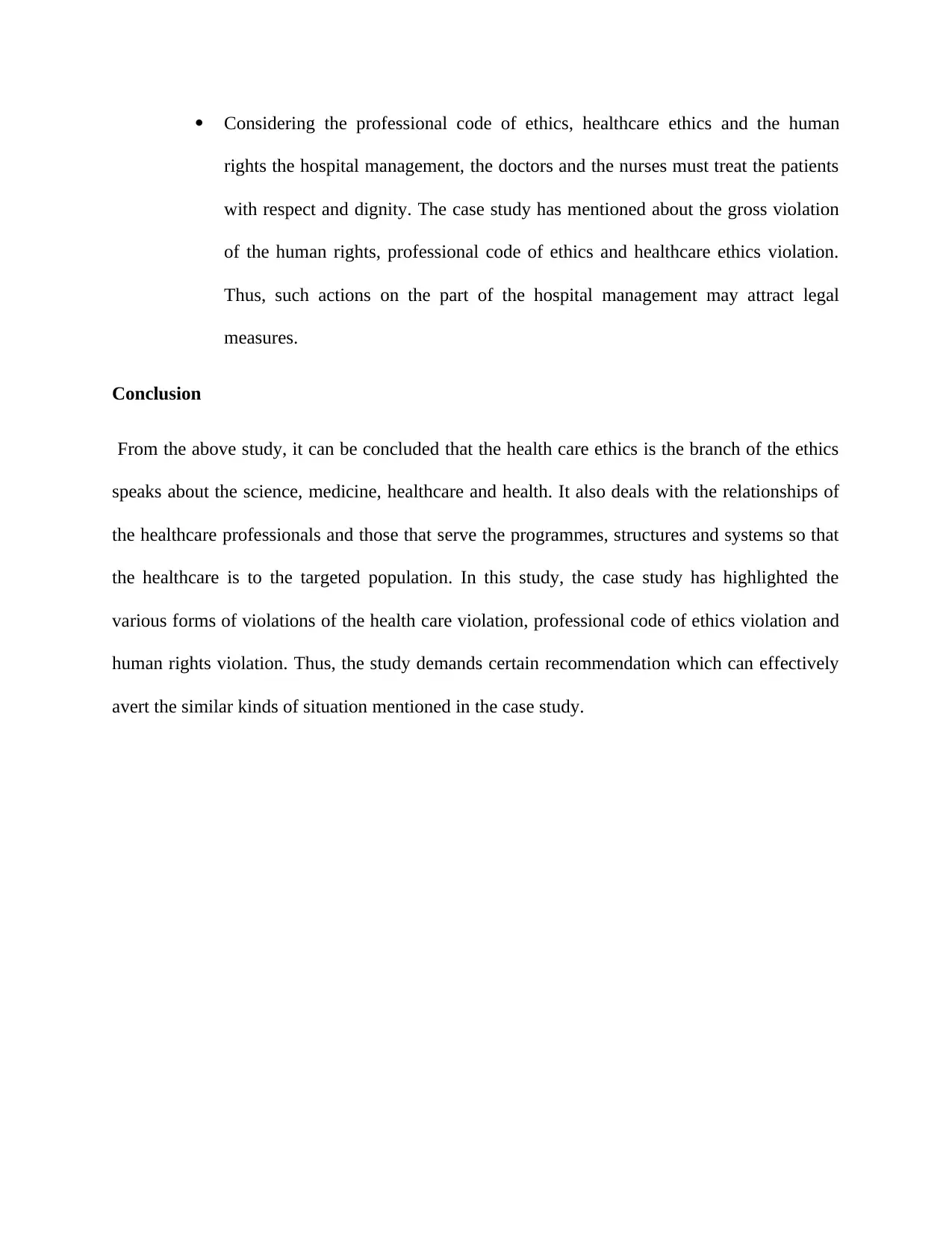
Considering the professional code of ethics, healthcare ethics and the human
rights the hospital management, the doctors and the nurses must treat the patients
with respect and dignity. The case study has mentioned about the gross violation
of the human rights, professional code of ethics and healthcare ethics violation.
Thus, such actions on the part of the hospital management may attract legal
measures.
Conclusion
From the above study, it can be concluded that the health care ethics is the branch of the ethics
speaks about the science, medicine, healthcare and health. It also deals with the relationships of
the healthcare professionals and those that serve the programmes, structures and systems so that
the healthcare is to the targeted population. In this study, the case study has highlighted the
various forms of violations of the health care violation, professional code of ethics violation and
human rights violation. Thus, the study demands certain recommendation which can effectively
avert the similar kinds of situation mentioned in the case study.
rights the hospital management, the doctors and the nurses must treat the patients
with respect and dignity. The case study has mentioned about the gross violation
of the human rights, professional code of ethics and healthcare ethics violation.
Thus, such actions on the part of the hospital management may attract legal
measures.
Conclusion
From the above study, it can be concluded that the health care ethics is the branch of the ethics
speaks about the science, medicine, healthcare and health. It also deals with the relationships of
the healthcare professionals and those that serve the programmes, structures and systems so that
the healthcare is to the targeted population. In this study, the case study has highlighted the
various forms of violations of the health care violation, professional code of ethics violation and
human rights violation. Thus, the study demands certain recommendation which can effectively
avert the similar kinds of situation mentioned in the case study.
Paraphrase This Document
Need a fresh take? Get an instant paraphrase of this document with our AI Paraphraser
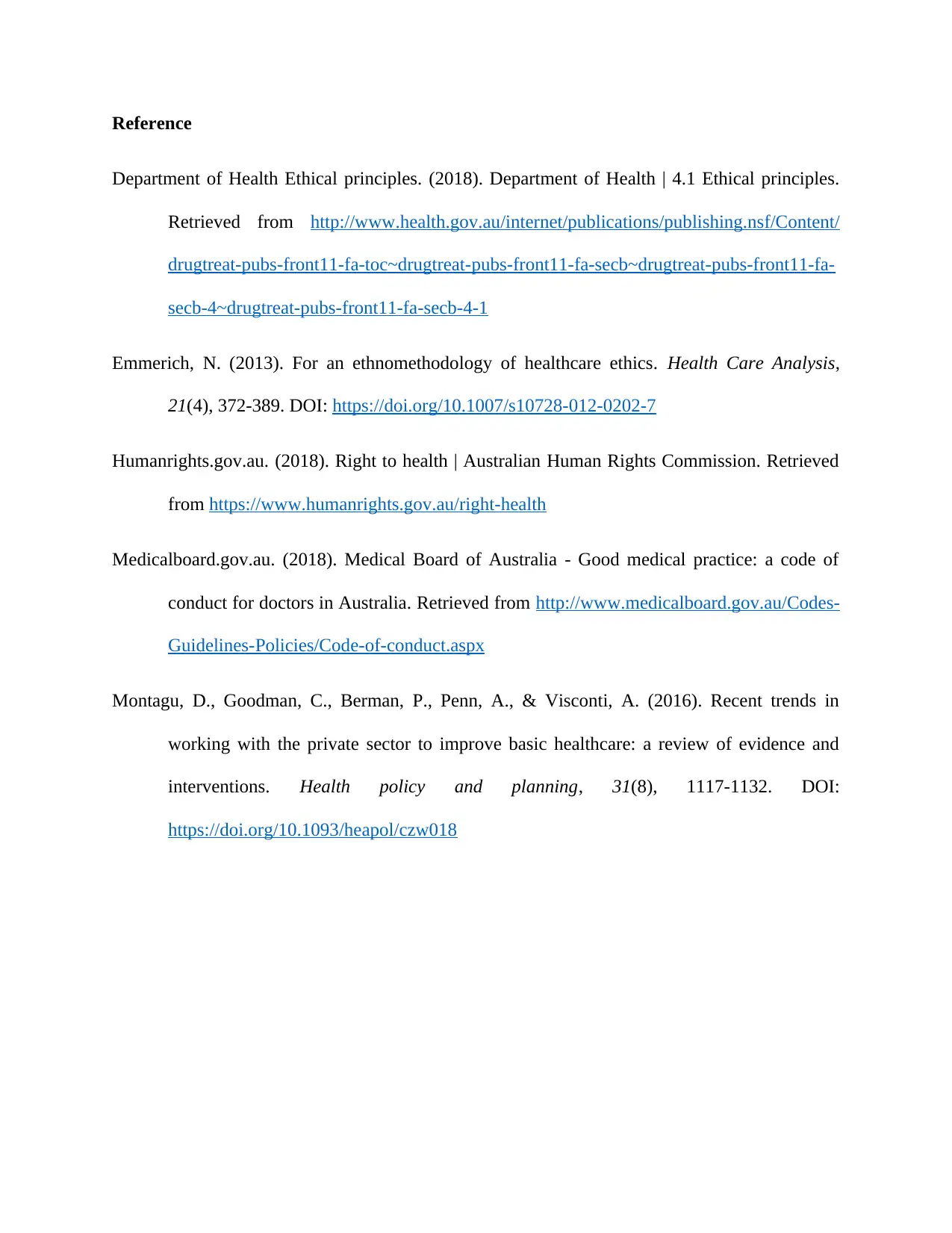
Reference
Department of Health Ethical principles. (2018). Department of Health | 4.1 Ethical principles.
Retrieved from http://www.health.gov.au/internet/publications/publishing.nsf/Content/
drugtreat-pubs-front11-fa-toc~drugtreat-pubs-front11-fa-secb~drugtreat-pubs-front11-fa-
secb-4~drugtreat-pubs-front11-fa-secb-4-1
Emmerich, N. (2013). For an ethnomethodology of healthcare ethics. Health Care Analysis,
21(4), 372-389. DOI: https://doi.org/10.1007/s10728-012-0202-7
Humanrights.gov.au. (2018). Right to health | Australian Human Rights Commission. Retrieved
from https://www.humanrights.gov.au/right-health
Medicalboard.gov.au. (2018). Medical Board of Australia - Good medical practice: a code of
conduct for doctors in Australia. Retrieved from http://www.medicalboard.gov.au/Codes-
Guidelines-Policies/Code-of-conduct.aspx
Montagu, D., Goodman, C., Berman, P., Penn, A., & Visconti, A. (2016). Recent trends in
working with the private sector to improve basic healthcare: a review of evidence and
interventions. Health policy and planning, 31(8), 1117-1132. DOI:
https://doi.org/10.1093/heapol/czw018
Department of Health Ethical principles. (2018). Department of Health | 4.1 Ethical principles.
Retrieved from http://www.health.gov.au/internet/publications/publishing.nsf/Content/
drugtreat-pubs-front11-fa-toc~drugtreat-pubs-front11-fa-secb~drugtreat-pubs-front11-fa-
secb-4~drugtreat-pubs-front11-fa-secb-4-1
Emmerich, N. (2013). For an ethnomethodology of healthcare ethics. Health Care Analysis,
21(4), 372-389. DOI: https://doi.org/10.1007/s10728-012-0202-7
Humanrights.gov.au. (2018). Right to health | Australian Human Rights Commission. Retrieved
from https://www.humanrights.gov.au/right-health
Medicalboard.gov.au. (2018). Medical Board of Australia - Good medical practice: a code of
conduct for doctors in Australia. Retrieved from http://www.medicalboard.gov.au/Codes-
Guidelines-Policies/Code-of-conduct.aspx
Montagu, D., Goodman, C., Berman, P., Penn, A., & Visconti, A. (2016). Recent trends in
working with the private sector to improve basic healthcare: a review of evidence and
interventions. Health policy and planning, 31(8), 1117-1132. DOI:
https://doi.org/10.1093/heapol/czw018
1 out of 8
Related Documents
Your All-in-One AI-Powered Toolkit for Academic Success.
+13062052269
info@desklib.com
Available 24*7 on WhatsApp / Email
![[object Object]](/_next/static/media/star-bottom.7253800d.svg)
Unlock your academic potential
Copyright © 2020–2026 A2Z Services. All Rights Reserved. Developed and managed by ZUCOL.





